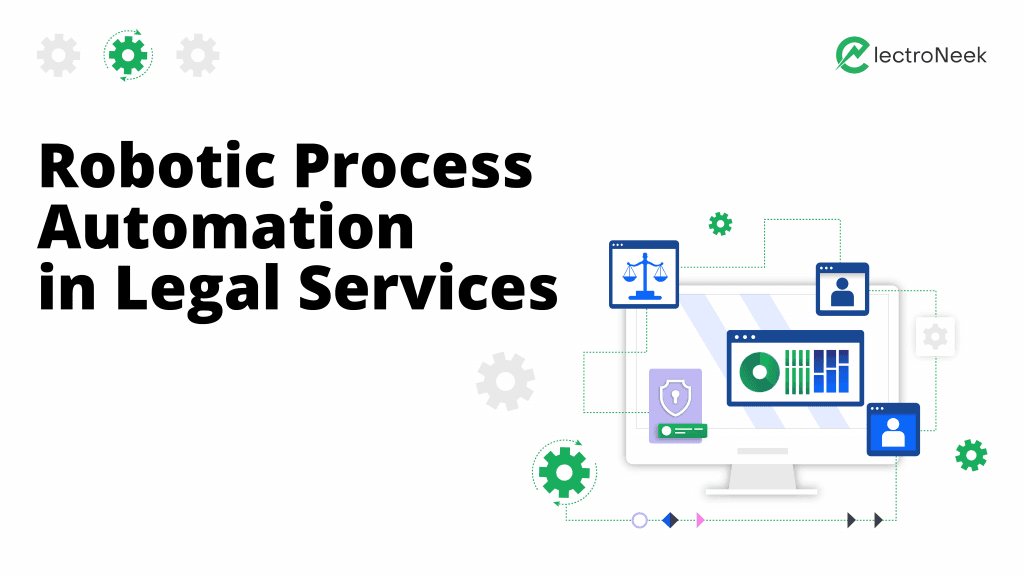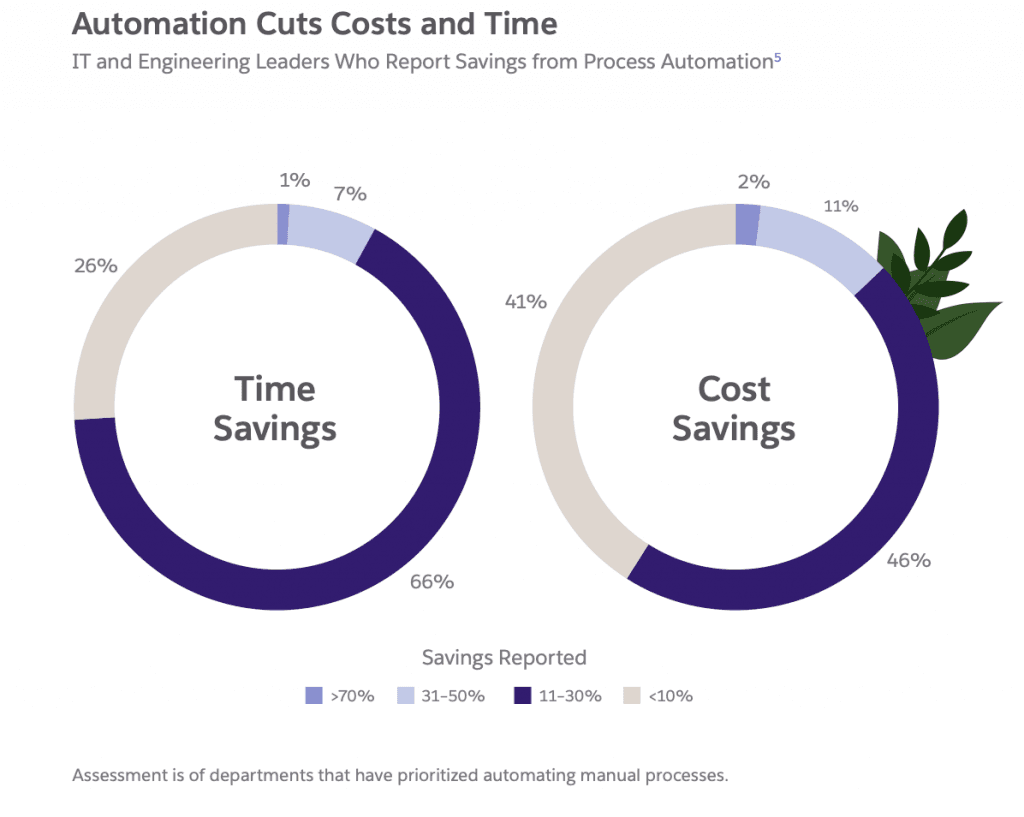
Digital transformation impacts every industry — and the legal industry is no exception. Law firms manually conducting mundane, repetitive procedures face increasing challenges compared to their competitors. The expense of long working hours, reduced productivity, costly errors, and less time for clients created by these mundane tasks give rise to the need for next-gen technology such as robotic process automation (RPA).
What exactly is RPA? This technology allows organizations to deploy “digital workforces” (otherwise known as programmed robots or bots) that emulate a human’s actions. In a law firm, these bots would eliminate the need for legal assistants and lawyers to spend time on mundane tasks that could otherwise be emulated and executed in a more efficient manner by a bot. By leveraging RPA bots for these tasks, lawyers and legal assistants are free to focus their efforts on the work they specialize in: solving their clients’ legal problems.
A simple example involves training a RPA bot to find keywords about a specific case from different sources, followed by extracting that data for input into an e-filing portal. The bot uses accurate algorithms and machine learning to follow predetermined steps to produce a logical outcome. A legal firm can leverage RPA bots to:
- Create templated contract drafts
- Compile legal citations
- Organize compliance and regulation changes
- Process information
- Collaborate with external legal services
With the proper set-up, RPA bots perform any rules-based task faster and more precisely than humans. Adopting an RPA solution allows legal clients to increase profitability, reduce the cost of errors, and improve a legal system’s efficiency.
Searching for an RPA Vendor with experience deploying bots for legal services? Check out ElectroNeek
Benefits of using RPA in law firms and legal departments
While there are many advantages to workflow automation, the single greatest advantage RPA offers law firms is in time savings. Charging per hour is a common practice in the legal industry, so applying automation in law firms can significantly reduce expenditures. However, there are many more benefits that RPA brings to the table:
Mitigated risks and reduced human error rate
RPA bots aid the legal team by automatically going through numerous documents in any designated database to identify hidden information related to any ongoing cases. For example, such a function will help reduce the time to review contracts, without errors and while making the appropriate corrections needed to mitigate any risks for your clients.
The RPA bot simply eliminates human errors. When manually extracting and inputting data, the legal team is more likely to make mistakes (such as missing some case information or inputting the incorrect data), making legal cases even more difficult.
Improved security and compliance
Consistent compliance checks are one of the most burdensome tasks for any legal department. For example, the legal team will have to constantly monitor and update to keep up with regulatory changes — a strenuous burden to place on any team. Anything missed carries severe penalties from governing bodies. RPA's regulatory bots automatically monitor and update changes based on the specific country's requirements; for the USA, that would mean scanning the entirety of each database listed by the Law Library of Congress.
RPA makes the process simple by assisting in protecting the company from fines. A contract specifies details concerning compliance, like following relevant laws and licensing requirements. Creating a digital archive for compliance regulations is vital — RPA bots quickly scan the complete database to locate relevant compliance information for delivery to the responsible team members.
Furthermore, RPA bots diligently create suspicious activity reports to mitigate any security risks. Such reports look at activities within a firm deemed suspicious and illegal, allowing the legal team to decide if a report needs filing. RPA bots can search and file information, and even browse and locate dodgy activities by clients.
Improved productivity
Legal teams may utilize RPA bots to eliminate most of the repetitive tasks they may face, such as:
- Compliance checks
- Canning data (documents, websites, tools, etc.)
- Creating spreadsheets
- Creating case documents
- Searching databases
- Filing reports
- Recording and store reports
- Reviewing case information
- Increases time and productivity by letting legal departments focus more on end clients.
A recent Salesforce report indicated that IT leaders felt technology integration such as automation had increased employee productivity by 25%.
Reduced costs
The same study by Salesforce indicated that technology leaders saw a 75% increase in cost savings when implementing workflow automation. Allowing a legal team to focus on higher-level, value-added tasks reduces the billing hours spent on long, repetitive tasks. With more of a focus on critical tasks, implementing RPA to the right processes can improve the overall cost to value ratio.

Allows workers to focus on high-value work
In some cases, RPA bots may completely free up a legal team’s time, allowing them to focus on value-added tasks and pay more attention to legal tasks.
Take ElectroNeek's Data Parsing bot as an example, which automatically extracts all types of data from websites, converts that data into more suitable formats, and stores the data in the relevant systems. If data gets extracted in a HTML format, the RPA bot converts that into a form easily understood by the team. This tool removes the need to manually search through many different websites to collect data, which often takes multiple days (or more) to complete. Additionally, this bot sends parsing completion and history reports for management and shareholders to view through notifications.
RPA implementation for legal teams: where to start?
As with the adoption of any technology, implementation should start small, and the same applies to the inclusion of RPA bots. Deploying new tech out of the blue has a high chance of failing. We suggest following these steps to maximize the chance of successful implementation:
- Appoint automation leads to oversee the RPA implementation.
- Start with choosing one pilot process to automate and mapping out every step involved in the workflow.
- Evaluate the benefit of adopting RPA for the pilot workflow. Is the chosen process repetitive enough, time-consuming, and rule-based?
- Create a plan to adopt each RPA bot without disrupting the experience of the legal team and their clients. A plan for awareness and training is essential as tech changes can be intimidating.
- Find a suitable RPA vendor with the right RPA solution for your clients.
Above all, the best way to give RPA a try is to find a reliable vendor that has a minimal entry threshold in terms of finance and allows them to try their product for free.
10 examples of legal processes you can automate
Let’s have a look at ten real-world use cases of automation in the legal industry:
1. Contract Management
Legal contracts contain robust data that add value to your client's business. Manually tracking, extracting, and recording such data correctly in a Content Management System (CMS) is time-consuming. A study conducted in 2018 by SpringCM displayed that 52% of respondents felt that tracking relevant data, important events, and deliverables were the main challenge in contract management.
When creating such contracts, the work doesn’t just stop there. After completing a contract, the legal team undertakes additional activities such as analyzing compliance, constituting service-level agreements, and managing any necessary document changes. With so many tasks at hand, contract management becomes challenging and more susceptible to errors without automation.

Source: SpringCM, 2018
RPA bots automatically extract data and input the data into a CMS accurately, Typical RPA platforms go one step further by creating dashboards and visualizing trends in real-time for legal teams to gain additional analysis from. These insights assist legal staff with detecting and preventing risks, while allowing for more data-driven decision-making. Additionally, RPA bots help a lawyer's daily work by providing comprehensible contract summaries and sending alerts to keep on top of contract milestones.
2. Risk assessment
All business decisions come with certain legal risks if not analyzed properly. Some common hazards include:
- Regulatory issues
- Insurance coverage
- Employment law
For instance, if a potential business decision has a negative impact on work wages or hours that are not compliant with legal requirements in a specific country, that decision-making may lead to a number of lawsuits.
RPA bots help determine risks through performance checks that analyze large volumes of relevant past case data to ascertain the legal implications of recent decisions, preparing for possible outcomes.
Furthermore, RPA bots build a complete risk assessment profile filled with the client details such as location, services,and relationships. This data integrates into easy-to-read documents that are extractable when needed.
3. Document automation
Document automation provides a central method for creating agreements, motions, invoices, and other similar documents in the legal industry. To make all such documents and forms digital, RPA bots implement, scan, validate any format, and convert reports into a predesignated format. These RPA bots create a high volume of reports in a short time, notice trends, and maintain up-to-date, easily accessible information.
For example, ElectroNeek's bot for scanned template data extraction recognizes and extracts data before storing the data in any relevant files.
Additionally, RPA bots leverage trigger words to create reports and find specific documents before automatically making changes and edits, so that information stays up to date. For example, when a legal team collects client information, RPA bots instantly create the documents and add any future updates automatically.
4. Internal and external communication
Legal departments continuously interact with internal management, various clients, stakeholders, other legal professionals, and vendors everyday. RPA makes all correspondence easy, efficient, and quick. A few ways in which RPA bots carry out these functions include when sending a legal case to a third-party, or sending confirmation of receiving and sending of documents. These RPA bots help reduce confusion and make sure no documents are missed or delivered twice. Additional examples include:
- Exchange documents with the help of an RPA managed portal. Plus, bots that automate file encryptions can keep data safe when exchanging.
- Confirmation of receiving or sending documents gets sent automatically.
- When a specific document gets viewed again or some record is left out, the relevant team gets notified.
5. E-discovery
E-discovery involves collecting, reviewing, and exchanging information in an electronic format for evidence in a case. This process allows professionals to deal with documents electronically in discovery and investigations. RPA bots assist with automating e-discovery through steps such as file indexing, Optical Character Recognition, and preparing and reviewing documents.
RPA in e-discovery allows legal staff to upload, review, and produce digital documents while avoiding long hours, extra costs, and stress. For instance, a legal team may leverage a RPA bot to quickly scan evidence for specific phrases in order to extract relevant case information and insights from an extensive database.
The data sources information by scanning through multiple sources, including emails, Microsoft documents, social media content, direct messages, smartphone applications, and even older sources such as files on a legacy system database.
6. E-filing
The challenge for many legal departments lies in extracting data from the CMS, submitting it to e-file portals, recording the specific case numbers, and tracking communication through a designated portal. Simply put, these tasks are repetitive and tiring. RPA bots automate e-filing processes, allowing the legal department to file reports together quickly and efficiently.
For instance, combining the current report data with updates in a specific case takes a long time when done manually. A legal staff would have to weave through numerous case numbers to find the correct one, then see which parts to update and submit the new version to the e-filing portal accurately. RPA bots quickly and accurately retrieve the specific documents, add the necessary updates, and present the information for review and submission all in one location.
7. Patent management
Legal departments are responsible for tracking patents and possible violations for prosecution, while also managing new and old patent ownerships. Needless to say, this is a time-consuming task if completed manually.
Leveraging RPA bots allows legal aids and lawyers responsible for patent management to digitize patent approval documents, monitor application statuses, and more.
8. Compliance checks
Every legal contract provides details on the laws, regulations, and licensing requirements that are relevant to each legal case, as well as who is responsible for maintaining compliance. According to Coalfire and Omdia, 58% of companies felt that compliance is a barrier to business opportunities.
By digitizing legal contracts, legal teams may store contracts in one secure, central location. RPA bots extract, search, and create a single depository for an entire law firm to avoid confusion or errors.
Furthermore, once the RPA bot learns any designated business process, the bot performs the same procedure consistently and accurately, allowing a legal team to maintain a high level of compliance.
9. Financial Management
Certain RPA bots assist legal departments with processing invoices from vendors, mapping out data in various formats and entering the compiled data into a financial planning system for payments. This presents legal teams with potential cost-savings, as bills generated from an existing management system save a lot on labor costs.
For instance, in the case of task-based bill estimations, RPA bots implement consistent file audits each month in an orderly manner. RPA bots track audit trails and the employees / clients that require payment within a management framework, before analyzing the reports fors billing and compliance issues. Additionally, RPA bots integrate task-based codes and capture relevant data.
10. Performance monitoring
RPA bots remove communication gaps between a law firm and its clients by fulfilling tasks as quickly and efficiently as possible. For instance, a company with many contracts and cases running simultaneously might face increased challenges monitoring the performance of internal legal teams and third parties.
RPA helps each legal team manage the entire process from a single interface, providing an overview of people involved in a case, court hearings, progress of specific vital cases, and many other details in real-time. Plus, RPA scales deployment when needed, making any adopted bot highly customizable to particular needs.
Searching for an RPA Vendor with experience deploying bots for legal services? Check out ElectroNeek
ElectroNeek is a one-of-a-kind RPA vendor with a revolutionary and attractive pricing model that removes the added expenditure of individual bot costs. For example, as an MSP partnered with ElectroNeek, Simply Automate deployed RPA bots created with ElectroNeek to solve various problems plaguing their legal clients.. With RPA bots, Simply Automate automated the process of logging into their clients’ CRM account by extracting the relevant information and inputting the data into the correct corresponding Health Insurance Portability and Accountability Act (HIPAA) document.
By automating the above function, one of their legal clients saved 70% of its time with minimal costs incurred by both parties.
Leverage RPA bots at your law firm
The constant fear of ‘can robots replace lawyers?’ has created a hurdle to the implementation of workflow automation for law firms. Yet, the answer remains ‘no’; it only assists in making their job easier. The adoption of RPA technology within your legal practice eliminates the need for time spent on labor-intensive tasks, allowing your legal teams to focus on what they do best: solve your clients’ legal issues.
With the added competitive advantage RPA bots offer, your client’s legal business can further scale and grow their firm rapidly. If you are interested in learning more about legal automation, please get in touch with our support team.
